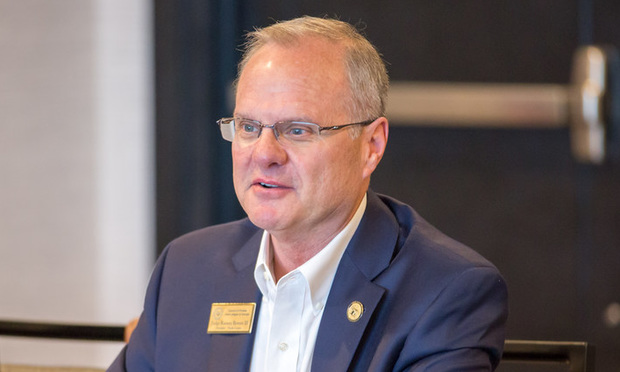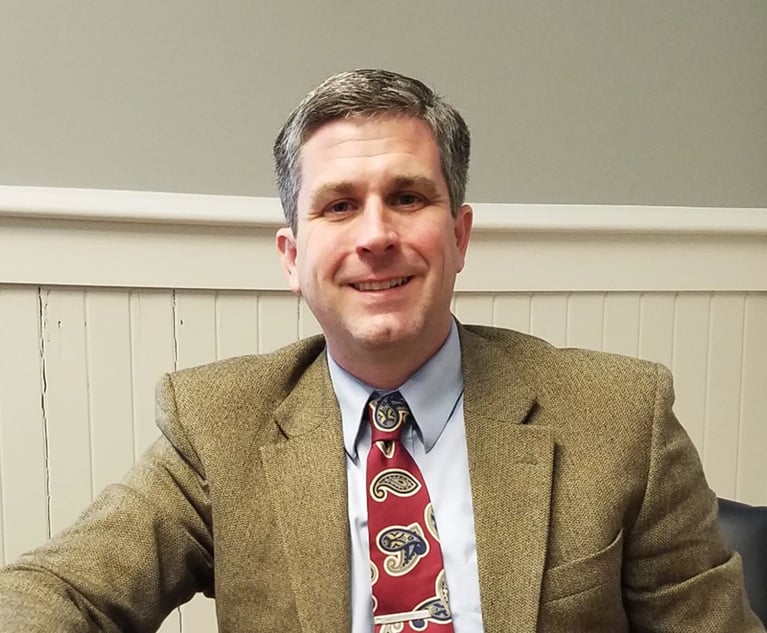Probate Court Leader Makes Case for Training Traffic Judges
They might not be the kind of judges most people think of as heading traffic court. The 20 who took three days of classes on the law governing field sobriety tests and other types of evidence were not state court traffic judges. They are probate judges.
November 09, 2017 at 08:07 PM
8 minute read
 Judge Rooney Bowen III, Council of Probate Court Judges of Georgia (Courtesy photo)
Judge Rooney Bowen III, Council of Probate Court Judges of Georgia (Courtesy photo) Judges from around the state gathered this week at a Georgia State Patrol station near the Capitol for training in handling traffic cases.
They may not be the kind of judges most people think of as heading traffic court. The 20 who took three days of classes on the law governing field sobriety tests and other types of evidence were not state court traffic judges. They are probate judges.
All 159 of Georgia's counties have probate court judges—who handle wills and estates, vital records, marriage licenses, gun permits and guardianships. Many of them—88 at the moment—also preside over traffic court, according to Probate Judge Rooney Bowen III of Dooly County Probate Court.
Bowen, the current president of the Georgia Council of Probate Judges, has made it his goal to offer traffic court training and certification to all those 88 judges. This week's session is one in a series the council is offering. It's the first such class of its kind, and Bowen said it will be mandatory by June of 2018.
“We're groundbreaking. We're trying to be proactive. We're trying to make our judges the best they can be,” Bowen said Thursday. “The more training the better.”
Probate Judge Danielle McRae of Upson County, chair of the council's committee for the traffic training certificate program, said Thursday that many of the judges in the training session preside over traffic court in small towns and rural communities like hers.
Traffic in general and traffic citations in particular have grown noticeably in the six years she has been in office, McRae said. The range of cases she hears starts with seat belt violations and continues in seriousness up through speeding and DUI.
The law that governs such cases can be as complex as other areas. Yet many of those probate judges are nonlawyers, according to Kevin Holder, the council's executive director. Of the 159 probate judges, only 41 currently are lawyers, Holder said.
The type of field sobriety training going on at the Capitol state patrol office this week was the subject of a recent controversial Georgia Supreme Court decision. Justice Nels Peterson wrote a unanimous opinion released Oct. 16, ruling that refusal to take a breath test for alcohol could not be used against a defendant in a DUI case. Although Peterson did not overturn the conviction at hand, the opinion started lawyers and drunk driving prevention advocates talking about its implications for the future and the need for understanding of it.
“The Georgia Constitution protects each of us from being forced to incriminate ourself,” Peterson wrote. “Unlike the similar right guaranteed by the Fifth Amendment to the U.S. Constitution, this state constitutional protection applies to more than mere testimony; it also protects us from being forced to perform acts that generate incriminating evidence. This case calls this Court to decide whether this state constitutional protection prohibits law enforcement from compelling a person suspected of DUI to blow their deep lung air into a breathalyzer. A nearly unbroken line of precedent dating back to 1879 leads us to conclude that it does, although the appellant here still loses because the language of the implied consent notice statute he challenges is not per se coercive.”
In a decision last week, the Georgia Court of Appeals tossed out evidence of drug possession because the police officer lacked a reasonable cause for making the traffic stop. In that opinion, Chief Judge Stephen Dillard overruled Lumpkin County Superior Court Judge N. Stanley Gunter's denial of a motion to suppress evidence.
If a traffic case is heard by a probate judge—lawyer or not—the chief superior court judge in the county is the first line of appeal, according to Bowen. He said superior court judges and other lawyers have stepped up to assist with the new traffic certification program.
Said Bowen, “Any time we can advance the training of a judge, we feel everyone is better served.”
 Judge Rooney Bowen III, Council of Probate Court Judges of Georgia (Courtesy photo)
Judge Rooney Bowen III, Council of Probate Court Judges of Georgia (Courtesy photo) Judges from around the state gathered this week at a Georgia State Patrol station near the Capitol for training in handling traffic cases.
They may not be the kind of judges most people think of as heading traffic court. The 20 who took three days of classes on the law governing field sobriety tests and other types of evidence were not state court traffic judges. They are probate judges.
All 159 of Georgia's counties have probate court judges—who handle wills and estates, vital records, marriage licenses, gun permits and guardianships. Many of them—88 at the moment—also preside over traffic court, according to Probate Judge Rooney Bowen III of Dooly County Probate Court.
Bowen, the current president of the Georgia Council of Probate Judges, has made it his goal to offer traffic court training and certification to all those 88 judges. This week's session is one in a series the council is offering. It's the first such class of its kind, and Bowen said it will be mandatory by June of 2018.
“We're groundbreaking. We're trying to be proactive. We're trying to make our judges the best they can be,” Bowen said Thursday. “The more training the better.”
Probate Judge Danielle McRae of Upson County, chair of the council's committee for the traffic training certificate program, said Thursday that many of the judges in the training session preside over traffic court in small towns and rural communities like hers.
Traffic in general and traffic citations in particular have grown noticeably in the six years she has been in office, McRae said. The range of cases she hears starts with seat belt violations and continues in seriousness up through speeding and DUI.
The law that governs such cases can be as complex as other areas. Yet many of those probate judges are nonlawyers, according to Kevin Holder, the council's executive director. Of the 159 probate judges, only 41 currently are lawyers, Holder said.
The type of field sobriety training going on at the Capitol state patrol office this week was the subject of a recent controversial Georgia Supreme Court decision. Justice Nels Peterson wrote a unanimous opinion released Oct. 16, ruling that refusal to take a breath test for alcohol could not be used against a defendant in a DUI case. Although Peterson did not overturn the conviction at hand, the opinion started lawyers and drunk driving prevention advocates talking about its implications for the future and the need for understanding of it.
“The Georgia Constitution protects each of us from being forced to incriminate ourself,” Peterson wrote. “Unlike the similar right guaranteed by the Fifth Amendment to the U.S. Constitution, this state constitutional protection applies to more than mere testimony; it also protects us from being forced to perform acts that generate incriminating evidence. This case calls this Court to decide whether this state constitutional protection prohibits law enforcement from compelling a person suspected of DUI to blow their deep lung air into a breathalyzer. A nearly unbroken line of precedent dating back to 1879 leads us to conclude that it does, although the appellant here still loses because the language of the implied consent notice statute he challenges is not per se coercive.”
In a decision last week, the Georgia Court of Appeals tossed out evidence of drug possession because the police officer lacked a reasonable cause for making the traffic stop. In that opinion, Chief Judge Stephen Dillard overruled Lumpkin County Superior Court Judge N. Stanley Gunter's denial of a motion to suppress evidence.
If a traffic case is heard by a probate judge—lawyer or not—the chief superior court judge in the county is the first line of appeal, according to Bowen. He said superior court judges and other lawyers have stepped up to assist with the new traffic certification program.
Said Bowen, “Any time we can advance the training of a judge, we feel everyone is better served.”
This content has been archived. It is available through our partners, LexisNexis® and Bloomberg Law.
To view this content, please continue to their sites.
Not a Lexis Subscriber?
Subscribe Now
Not a Bloomberg Law Subscriber?
Subscribe Now
NOT FOR REPRINT
© 2025 ALM Global, LLC, All Rights Reserved. Request academic re-use from www.copyright.com. All other uses, submit a request to [email protected]. For more information visit Asset & Logo Licensing.
You Might Like
View All
On The Move: Squire Patton Boggs, Akerman Among Four Firms Adding Atlanta Partners
7 minute read

Justice 'Weaponization Working Group' Will Examine Officials Who Investigated Trump, US AG Bondi Says

Trending Stories
- 1Parties’ Reservation of Rights Defeats Attempt to Enforce Settlement in Principle
- 2ACC CLO Survey Waves Warning Flags for Boards
- 3States Accuse Trump of Thwarting Court's Funding Restoration Order
- 4Microsoft Becomes Latest Tech Company to Face Claims of Stealing Marketing Commissions From Influencers
- 5Coral Gables Attorney Busted for Stalking Lawyer
Who Got The Work
J. Brugh Lower of Gibbons has entered an appearance for industrial equipment supplier Devco Corporation in a pending trademark infringement lawsuit. The suit, accusing the defendant of selling knock-off Graco products, was filed Dec. 18 in New Jersey District Court by Rivkin Radler on behalf of Graco Inc. and Graco Minnesota. The case, assigned to U.S. District Judge Zahid N. Quraishi, is 3:24-cv-11294, Graco Inc. et al v. Devco Corporation.
Who Got The Work
Rebecca Maller-Stein and Kent A. Yalowitz of Arnold & Porter Kaye Scholer have entered their appearances for Hanaco Venture Capital and its executives, Lior Prosor and David Frankel, in a pending securities lawsuit. The action, filed on Dec. 24 in New York Southern District Court by Zell, Aron & Co. on behalf of Goldeneye Advisors, accuses the defendants of negligently and fraudulently managing the plaintiff's $1 million investment. The case, assigned to U.S. District Judge Vernon S. Broderick, is 1:24-cv-09918, Goldeneye Advisors, LLC v. Hanaco Venture Capital, Ltd. et al.
Who Got The Work
Attorneys from A&O Shearman has stepped in as defense counsel for Toronto-Dominion Bank and other defendants in a pending securities class action. The suit, filed Dec. 11 in New York Southern District Court by Bleichmar Fonti & Auld, accuses the defendants of concealing the bank's 'pervasive' deficiencies in regards to its compliance with the Bank Secrecy Act and the quality of its anti-money laundering controls. The case, assigned to U.S. District Judge Arun Subramanian, is 1:24-cv-09445, Gonzalez v. The Toronto-Dominion Bank et al.
Who Got The Work
Crown Castle International, a Pennsylvania company providing shared communications infrastructure, has turned to Luke D. Wolf of Gordon Rees Scully Mansukhani to fend off a pending breach-of-contract lawsuit. The court action, filed Nov. 25 in Michigan Eastern District Court by Hooper Hathaway PC on behalf of The Town Residences LLC, accuses Crown Castle of failing to transfer approximately $30,000 in utility payments from T-Mobile in breach of a roof-top lease and assignment agreement. The case, assigned to U.S. District Judge Susan K. Declercq, is 2:24-cv-13131, The Town Residences LLC v. T-Mobile US, Inc. et al.
Who Got The Work
Wilfred P. Coronato and Daniel M. Schwartz of McCarter & English have stepped in as defense counsel to Electrolux Home Products Inc. in a pending product liability lawsuit. The court action, filed Nov. 26 in New York Eastern District Court by Poulos Lopiccolo PC and Nagel Rice LLP on behalf of David Stern, alleges that the defendant's refrigerators’ drawers and shelving repeatedly break and fall apart within months after purchase. The case, assigned to U.S. District Judge Joan M. Azrack, is 2:24-cv-08204, Stern v. Electrolux Home Products, Inc.
Featured Firms
Law Offices of Gary Martin Hays & Associates, P.C.
(470) 294-1674
Law Offices of Mark E. Salomone
(857) 444-6468
Smith & Hassler
(713) 739-1250






